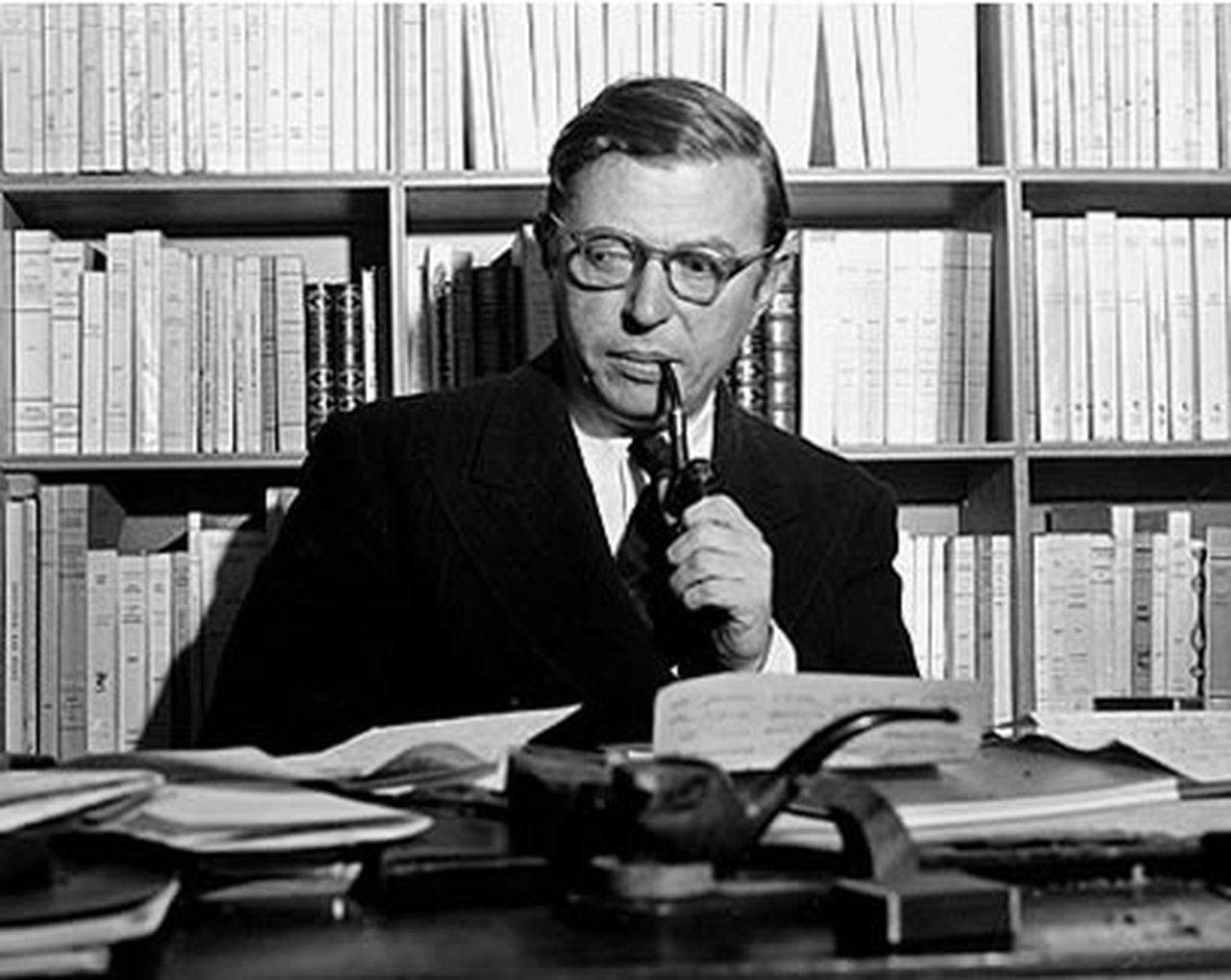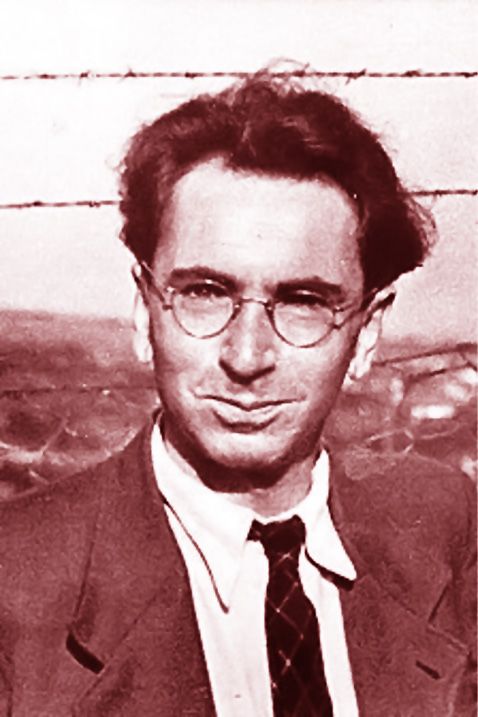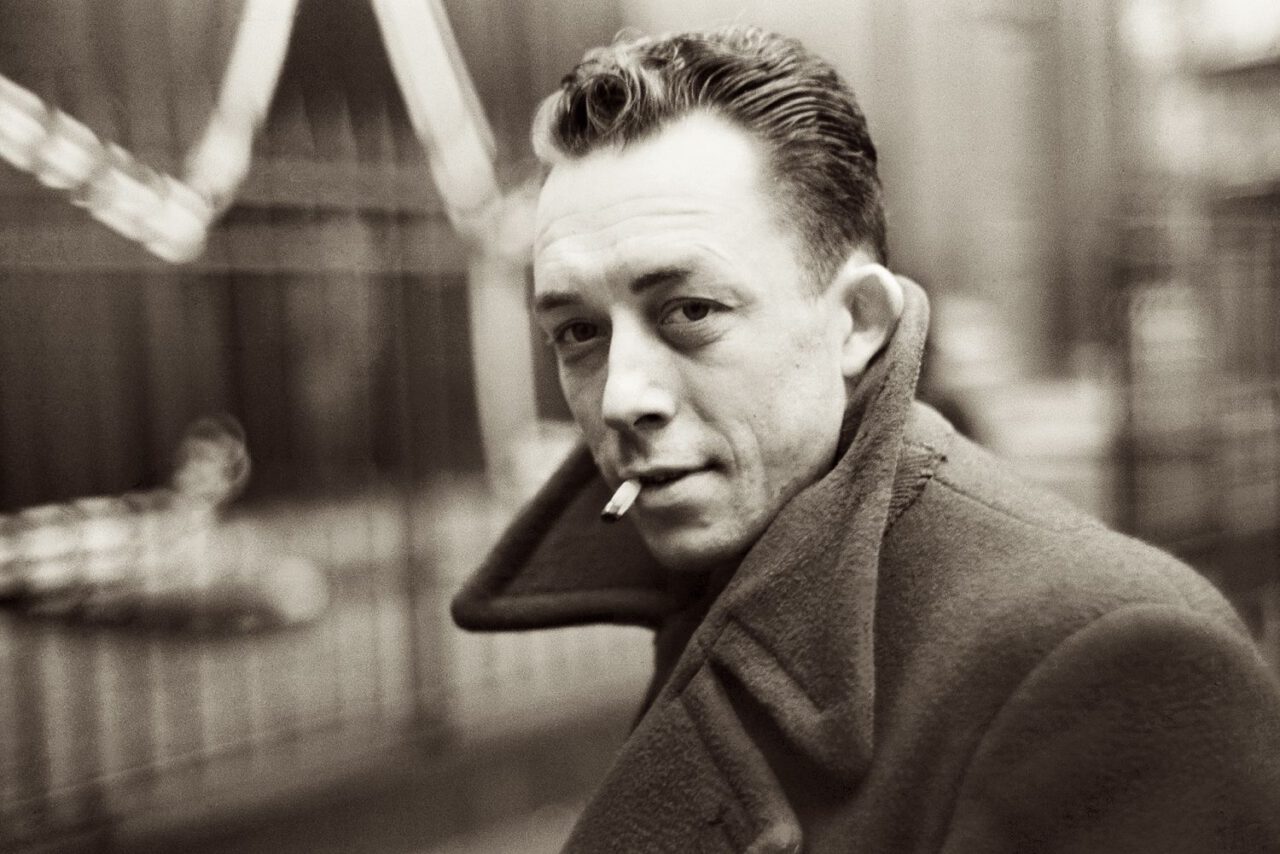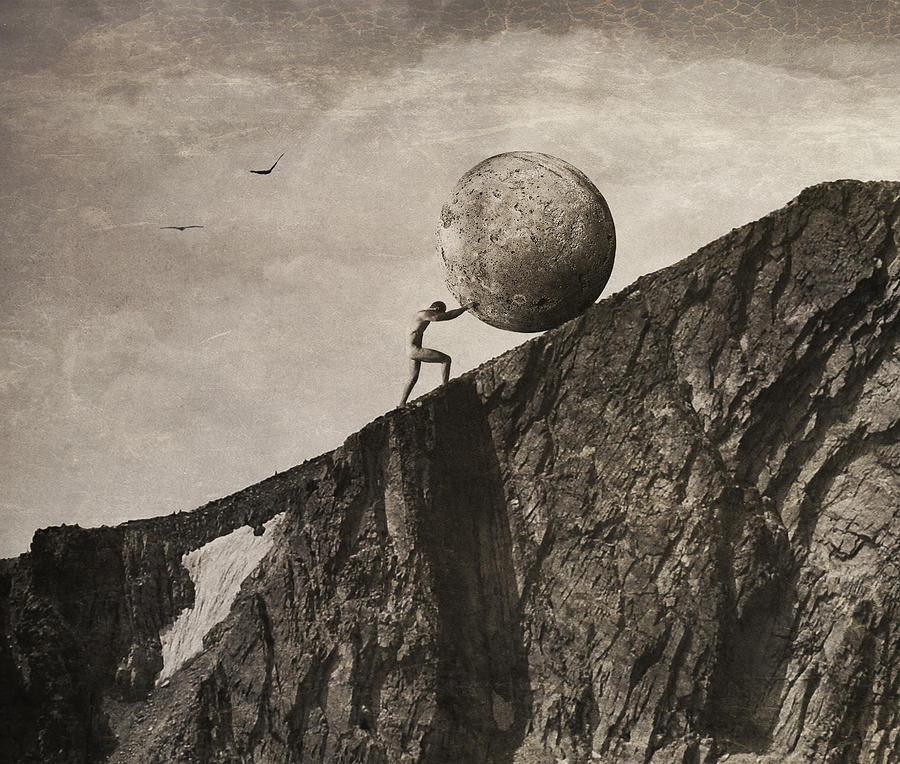Reflection 2: Existentialism
Have you ever had one of those dream-like moments when you see something for what it really is? We are in a constant state of sensory overload, our brains cleverly filter through all the incoming signals to give the world some perspective.
When you focus intensely on one object it can start to take on a different perspective. The classic example is that of a chair. Four posts, a flat section and a back- metal, wood or cloth. It is a meaningless object until we attach purpose to it by actually sitting on it or associating it with past experience. The object exists and only takes on the essence of chair once it is recognised and used as such.

This concept is one of the central tenets of a branch of philosophy known as existentialism. Jean Paul Sartre is one of my favourite existentialists. He developed the idea that "Existence precedes Essence".
Jean Paul Sartre 1905-1980

For humans this means that we are born without purpose, we exist first, grow to perceive ourselves and then go onto to define our own essence as a person. This clashes with some religious and philosophical belief (See Thomas Aquinas and Aristotle) that we are all born with a purpose. Existentialists purport that we create our own destiny. Ultimately we are responsible for the decisions we make, we have the final say in our actions and choices. Sartre siding Existentialists are proponents of the concept of free will. We are charged to determine what we wish for ourselves, even if we don't obtain that we are still free to choose how we behave in any given circumstance.
Here is where the difficulty arises for us as sentient beings. As we become aware of this responsibility for shaping our own lives we can experience a feeling called angst. An anxiety, uncertainty and hesitancy brought on by the realisation that the consequences of our actions are directly linked back to us as individuals. We simultaneously see both the power to influence our life and that of others.
If someone becomes more introspective with this idea they may come to see that how we choose to live is "the most ideal way" we can think of- well we may justify that to ourselves. Here's the crux of the matter though, by projecting out own "ideal" example out into the world we are setting an example for others. "This is how I choose to live my life, here is my model for you all." The consequences, good or bad, are our responsibility. We can choose the light or dark path, and even change direction at any time. We are setting an example for all mankind by our words, actions and inactions. No wonder the word angst is used to describe this human freedom and responsibility...phew.
A great example of angst that comes with discovering the level of freedom humans can own can commonly be re-created. Standing on the edge of a high cliff edge (or bungee-jump as I found out), there may be a momentary realisation that you fear falling off but also understand that you are in control of not stepping off the cliff. That control is yours, there is no other force that can hold you back but your own freedom to choose.

Existentialists do not believe we have a priori human "natures". Instead we use our own consciousness to interpret our own lives and create meaning. We can choose to speak or act in a given way even if it is wholly incongruous with our situation. When we choose a particular action we should do it with "authenticity" and take responsibility. Decision for the existentialist is subjective in nature as opposed to being purely rational. By constructing our personal wishes internally and acting them out in a truthful, authentic manner we give life meaning and we derive motivation for living.
"Man's search for meaning" by Victor E. Frankl is one of the most influential books I have ever read. A testament to the strength of the human spirit in the face of despair. Frankl endured horrendous conditions while being held as a Jewish prisoner in Nazi concentrations camps. His harrowing story sends a clear message for us: When we can no longer change our circumstances, we can still change ourselves. A quote of his that still gives me great strength in harder times is one that for me defines the essence of bravery:
" Everything can be taken from a man but one thing: the last of human freedoms- to choose one's attitude in any given set of circumstances, to choose one's own way"
Victor Frankl 1905-1997

Many will have picked up a copy of Albert Camus' "The Plague" during the past year. Camus has been classed as an existentialist thinker (although he refuted this label) and his insights are still as fresh today as ever. The story revolves around an outbreak of bubonic plague in an Algerian town called Oran. It is an uncomfortable read, especially in the context of the current pandemic. The horrors of the illness itself are central to the story but there are several themes that permeate the pages. What we find is a claustrophobic reflection on how adversity can affect human compassion, solidarity, reasoning and endurance. There are striking similarities between the book and some of the human reaction to the COVID-19 pandemic. People come together to help one another, some devote their efforts to caring for their loved ones while others act in a selfish manner, often out of fear. The effects of human isolation are explored with the town being cut off and the afflicted being made to self isolate. Boredom, repetition and paranoia feed into the minds of the townsfolk. Funerals are banned so grief is amplified. The novel has been viewed as an allegory to the Nazi occupation of France. The dehumanisation of the plague victims holds many similarities to the genocides that took place under the guise of national socialism in the 1940's.
A powerful underlying theme is the search for meaning in the face of tragedy. It is not heroism that Camus purports as the necessity when faced with adversity, it is "common decency". Here we come back to the idea of authenticity. Sure, we all would like to think we are capable of heroic acts and to shape the destiny of those less fortunate. How often do we actually realise these ideals though? Camus seems to argue that we are most effective as decent human beings when we act within our subjective capabilities and perform genuine virtuous acts. The "heroes" of the story to me appear to be the health care workers. They go about their duties without heroic expectations of themselves, simply that "plague is here and we've got to make a stand".
Albert Camus 1913-1960

Camus is linked most closely with the idea of absurdism. This concept plays on the fact that humans are compelled to seek meaning in life but can never find this with any true certainty. Although this could be viewed as a rather depressing outlook, Camus encourages us to welcome this reality with open arms. Camus does not hold the common existential belief that we hold free will and can create meaning thorough our actions. Instead, his branch of absurdism focuses on the fact that humans must be defiant and persist in the face of the unresolved tension that we can't find absolute meaning in life. We may find meaning in the pursuit of meaning however, and he explores the concept that out lives can be broken down into transient, personal quests to give meaning to our existence. Camus argues that to truly find joy in life we must accept the absurdity of it all. As we journey through life looking for some ultimate meaning we come up against the chaotic disorder of the world which can lead to disillusionment and angst. Camus advises that we can never truly live if we are looking for the definitive meaning of life. Accepting that we live in an irrational universe can lead to the realisation that we can create whatever meaning we wish for our lives.
In his famous novel "The myth of Sisyphus", Camus challenges us to try and enjoy the process of trying to achieve our goals in life. Rather than project your happiness towards the fulfilment of a task, it is important to try and enjoy the steps towards that final result. Sisyphus is punished by the gods for cheating death on two occasions. His penance is to push a huge boulder up to the summit of a steep slope only for it to roll all the way to the bottom again. He goes through an eternal cycle of pushing the rock up the hill and following it down to repeat the process over and over. The symbolism is clear, the daily grind being repeated with no ultimate meaning or result. Camus famously asks us to "imagine Sisyphus happy" in his task. To think ahead about the fact that the rock will roll back down the hill would lead to an unbearable mental torture. A change in focus to finding purpose and even enjoyment in his exertions gives Sisyphus relief from that long term punishment. Basically, the idea that living for the moment can give us relief from the absurdity of existence.

When I have read Camus' novels I am struck by his admiration for acts of kindness towards other humans. He acknowledges the inevitability of death, in fact he embraces the fact that it is such an integral part of human existence. His view is that death nullifies all our actions in life, no matter how profound our discoveries about the meaning of life, death makes these ultimately meaningless. A rather bleak outlook in some respects, but hold on.... if all we do in life inevitably leads to us dying then should we take ourselves so seriously? Should we spend our lives striving for money, status, postnominals, fame and possessions when they are instantly perishable? Camus instead reflects throughout his writings on the value of altruism towards our fellow man. We are all on the same path but few of us live our lives openly accepting that we are going to die. Recognising that fragility in ourselves and others can lead to a levelling of the existential playing field. Camus pleas with us to accept our mortality and not expend all our energy trying to fix everything, but to make the most of the time given to us:
"Life is a hospice, never a hospital"
For me this all comes down to a few principles. Life is tough, there will be suffering and we may all face the "dark night of the soul". Trying to find purpose and meaning in material things is a transient fix. Make long term plans and set yourself goals but do not let your life pass you by while you work towards fulfilment. Try to thrive and flourish during the struggle and process of achieving your goals, even if you don't make it to the end of the task you will gain enjoyment during the voyage. Recognise your own mortality and that of others- this gives me a sense of gratitude for each day but also an appreciation for other people's lives- how precious life really is. Find a purpose that makes life enjoyable most of the time and bearable during the dark times. For me that purpose is to try and help other people in my job as a palliative care doctor. I am no saint. I have come to realise that I personally find meaning and purpose in life by trying to help others. I am lucky to have a job that allows me to constantly refresh my existential motivation.
We often talk about an "existential crisis" in palliative care. Maybe after reading this blog the term will have a clearer meaning. Challenged with extreme life changes, serious illness or the reality of dying we may undergo such a crisis. A profound questioning of what is the meaning of our life, what has been the purpose of our life, have we lived life to the full (now we are faced with its end) or what comes next? The core concept of an existential crisis is the sudden collapse of the belief that your life has had a certain purpose and meaning. The death of a loved one who we have built our existence around, the loss of a job that has been the focus of all your energy or the faltering of a previously strong religious faith are all examples of such events.
An important point about any existential crisis is that they should not be viewed as completely negative experiences. They are often phases of personal growth and reflection. Guilt about previous actions may lead to conflict resolution and healing of old wounds. Loss of a person or career may allow a reframing of a person's life and take them on a different path which leads to unexpected peace. An acceptance of a terminal diagnosis may lead a person to live more in the moment and cherish the time remaining with their loved ones- a time to make new memories and say the things that may have held back on before. Being able to say: I love you, I'm sorry, Forgive me, I forgive you and finally Goodbye may all result from an initial painful existential crisis. It is so important to explore such experiences with people and help them to find some form of resolution if possible. If left unaddressed then such emotions can contribute to uncontrolled physical symptoms, psychological distress and spiritual isolation feeding into the concept of total pain (Cicely Saunders)
In an age when technology has freed up our time and filled it with arguably less sustainable meaningful resources, I would argue that doing something helpful for others is even more vital for our existence than ever before. Victor Frankl coined the term "existential vacuum" which he envisaged leading to rising depression, addiction and anxiety in society. We need human contact, a fact brutally laid bare by COVID-19. So try to use technology for good, to reach out to others and maybe you will find that there can be meaning derived even in the emerging vacuum of our digital age. Ditch the phone, the laptop or the TV and connect with people- it is in other people that we can truly find the meaning of our lives.